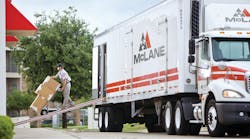Headquartered in Temple, Texas, McLane Company was founded in 1894. With over $50 billion in revenue, it is one of the largest distributors in America, serving convenience stores, mass merchants, and chain restaurants. McLane’s private fleet (No. 44 on the FleetOwner 500) comprises approximately 3,900 tractors, 6,200 trailers, and 159 straight trucks.
A partner to the biggest retail and restaurant businesses, McLane buys, sells, delivers, and serves the world’s most beloved brands. The company has more than 80 distribution centers across the country, employs more than 25,000 teammates, and delivers to nearly every zip code in the U.S.
As chief administrative officer for McLane Company, Larry Parsons is responsible for all legal, marketing, communications, safety, food safety, security, aviation, insurance, claims, worker’s compensation, corporate governance, and sustainability matters.
A National Private Truck Council Board of Directors member, Parsons is the chair of the council’s Legislative and Regulatory Affairs Committee, an NPTC Institute Board of Governors member, and a frequent speaker at NPTC conferences.
I recently spoke with Parsons about the success of McLane’s private fleet. The following Q&A has been edited for clarity.
Gary Petty: How does the private fleet justify itself?
Larry Parsons: Maintaining a private fleet enables us to provide superior customer service and quality. Our drivers are the face of McLane and often the representative of our company customers interact with most. It creates a connection that wouldn’t exist if we operated otherwise. Our customized equipment, like multi-temperature and door trailers, allows us to deliver products in top quality and condition.
Petty: What are the challenges facing your private fleet?
Parsons: Our most significant challenges are around staffing—having enough drivers to meet demand—and maintenance costs. The driver workforce is retiring in greater numbers than they are entering the industry, but we are committed to serving as an employer of choice and have robust recruiting and training programs to keep our candidate pipeline strong.
Supply chain challenges have affected the availability of parts and equipment, which has, in turn, impacted maintenance costs. We operate in a final mile distribution network, so our equipment is very customized and unavailable in a common carrier environment.
Petty: What is the operation model of running the fleet?
Parsons: Our private fleet facilitates our ability to make deliveries directly to our customers’ locations, which include restaurants, convenience stores, and mass merchants. Our equipment is very specialized and not available in the common carrier environment. Servicing our customers requires multi-temp and multi-door equipment customized to our specific business needs.
Our drivers are the “heart and soul” of the McLane Company. If we had someone else delivering, then we would lose some of our connection to our customers. The relationship between our drivers and the employees and management at our customers’ locations is critical to our success.
Petty: How much do you rely on outside carriers and 3PLs? Do you lease or own equipment?
Parsons: We rely very little on outside carriers and 3PLs. We have both owned and leased equipment.
Petty: How do you use active safety technologies to improve fleet performance
Parsons: Safety is a key priority across our company. We continually invest in the latest technology and implement best practices. We use cameras and event recorders in vehicles to monitor driver behavior and proactively identify areas for improvement. We have an OEM suite of packages with levels 2 and 3 advanced driver-assistance systems, including features like lane keep assist, alarms, and adaptive cruise control.
Petty: How do you see artificial intelligence and electric vehicles impacting your fleet?
Parsons: With our current operations, McLane drivers will always make the final mile delivery. We have piloted AI opportunities and will implement new technology as it makes sense for our business. We currently use electric tractors and yard trucks in our fleet. Range and weight are the main challenges with electric tractors, so Class 8 diesel tractors work best for now. But as battery technology advances, we could add more EVs to our fleet.
Petty: What health and wellness programs do you have for drivers?
Parsons: We take a whole-person approach to wellness, which includes physical, mental, and financial health programs to help each teammate. We have a variety of benefits, effective from Day One, for our drivers, including:
- Major medical, dental, and vision
- Virtual care, including a 24/7 nurse line and virtual physical therapy
- Medical savings accounts (FSAs and HSAs)
- Voluntary benefits like accident and hospital coverage
- Employee Assistance program for drivers and their families
Petty: How would you assess the value of NPTC?
Parsons: The council’s annual Benchmarking Survey Report is first-rate work. It provides invaluable data to compare our fleet operation with the industry. I find that participating in NPTC’s events and being directly involved as a Board member help validate the things we’re doing. The government affairs advocacy carried out by the association helps me stay on top of legislation that impacts McLane. I intend to explore how McLane can get involved in NPTC’s excellent training and certification programs in the years ahead.
Petty: What is your outlook for the future of McLane and its fleet?
Parsons: McLane will soon be 130 years old. We could keep doing what we’re doing, making incremental changes, and keep being profitable for a long time. But the only way you really succeed is to look at yourself critically and say, what do I need to change to improve the lives of our customers, our teammates, and the communities where we live and work? What are my competitors doing? What’s not working? What are my customers unhappy about? And then you act upon that: what will help us protect our core business, what’s next, and what resources and skills do we need for the future?
I’m excited because we’re conducting that self-critical analysis and planning for everything we do, including our private fleet operations. We’ll embrace the latest equipment technology as it comes to market. The foundations for the McLane driver of tomorrow are under construction today.
We’ve spent the time to figure out what we’re going to focus on in the short term and the long term. We’re putting the resources in place to make sure that succeeds. I’ve seen what succeeds and doesn’t, and we’re on the right path.
Gary Petty is president and CEO of the National Private Truck Council and FleetOwner’s private fleet editor.





